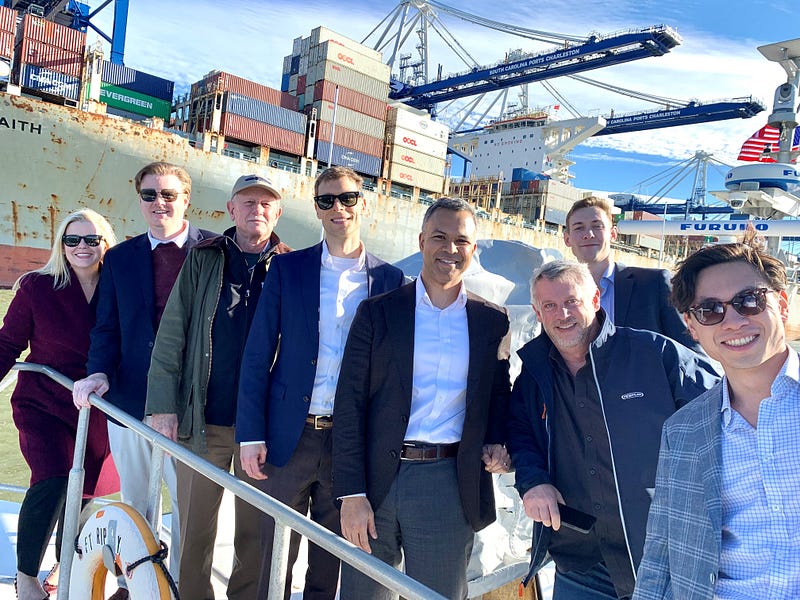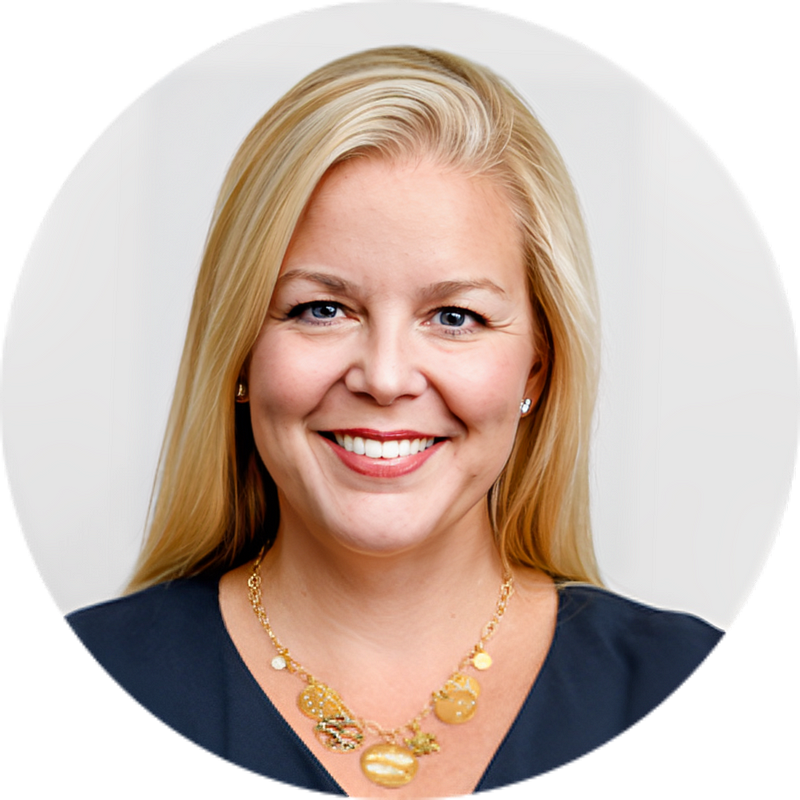Role model your values. I’ll never forget one of my first bosses who, even under considerable pressure as the market hit headwinds, treated each of us with professional respect, choosing words thoughtfully to recognize our achievements and kindly but sternly to deal with our performance setbacks. Few things motivate a team better than a leader who lives by the Golden Rule.
We are living in the Renaissance of Work. Just like great artists know that an empty canvas can become anything, great leaders know that an entire organization — and the people inside it — can become anything, too. Master Artists and Mastering the Art of Leadership draw from the same source: creation. In this series, we’ll meet masters who are creating the future of work and painting a portrait of lasting leadership. As part of this series, we had the pleasure of interviewing Allison Kingsley.
Allison is a Partner and a Founder of NOVA Infrastructure and has 22 years of experience working in infrastructure, project finance, investment banking, and risk. Since 2017 Allison has built NOVA with Chris Beall, forming the NOVA team and leading the execution of infrastructure investments for NOVA in the target sectors of transportation, environmental services, energy and energy transition, and communications. Allison serves on NOVA’s Investment Committee and also functions as NOVA’s Chief Risk Officer. Allison holds a Ph.D. from Columbia University, an M.S.L. from Yale Law School, and a B.A. cum laude from Rice University.
Thank you for joining us. Our readers would enjoy discovering something interesting about you. What are you in the middle of right now that you’re excited about personally or professionally?
I spend my days investing in infrastructure businesses that generate essential power and clean water, as well as dispose of waste, transport cargo, bridge the digital divide and create jobs. Right now, I am especially excited about untangling the supply chain and building out a logistics platform in Charleston, SC, one of the fastest growing port markets in America. In my spare time, I’m an avid open water swimmer and dream of swimming across the Strait of Gibraltar, starting in Europe and finishing in North Africa — both places I’ve lived.
We all get by with a little help from our friends. Who is the leader that has influenced you the most, and how?
Dolly Parton. Born into poverty and consistently underestimated, Dolly Parton believed she could achieve her impossible dream. By pairing her talents with indefatigable tenacity, she made and broke records, all with a wicked sense of humor and while giving back to those less fortunate. Appreciating I’m no musician (although I am blonde), Dolly inspires me to creatively outperform expectations of what’s possible.
Sometimes our biggest mistakes lead to our biggest discoveries. What’s the biggest mistake you’ve made as a leader, and what did you discover as a result?
I undervalued my superpowers. Like most people in competitive environments, I am surrounded by smart and talented people, many of whom have professional superpowers that are categorically different from mine. My cofounder and our CFO both come to mind. Comparing myself against others’ superpowers is distracting. Figuratively speaking, I cannot fly,make myself invisible, or shoot webs out of my hands. But if I can read minds or run through walls, I can be a critical and complementary part of the team. Fundamentally, my belief is that everyone on my team has superpowers, and my job now is to help each of us fully realize our strengths. Kapow. Bam. Shazam!
How has your definition of leadership changed or evolved over time? What does it mean to be a leader now?
Leadership is often narrowly construed to represent the intersection of technical ability and vintage year. In finance, if you are a good investor and at a certain position/age in your career, you are assumed to be a good and ready leader. While some great investors have companion strengths in leadership, this is not uniformly true. In some cases, the best technical investors may be the worst leaders. In many cases, the years-of-experience equation does not necessarily equal emotional intelligence or good judgment. I reject the formula that good leaders are defined as “a certain vintage” in a predictable career. I embrace the idea that good leaders are heterogeneous and surprise to the upside. I am excited by how our fund has been leading in this area.
Success is as often as much about what we stop as what we start. What is one legacy leadership behavior you stopped because you discovered it was no longer valuable or relevant?
I stopped listening to the haters. Earlier in my career, I internalized every criticism and naysayer. As someone who takes risks (and makes mistakes), I can be a lightning rod. As I’ve grown, I’ve tried to keep my own counsel better, listening only to people I respect and committing unequivocally to my own values. Doing it my way has paid off. Against the odds, I earned the highest degrees from the best schools, lived in some of the world’s most dangerous and stimulating places, built an unconventional career in academics and finance, successfully cultivated family and work, overcame a debilitating orthopedic injury, and finally realized my quietly-but-fiercely-held dream of founding a private equity fund to invest in critical infrastructure.
What is one lasting leadership behavior you started or are cultivating because you believe it is valuable or relevant?
The power of the pause. While an immediate response or the “violence of action” (a Navy SEALS term) is sometimes warranted, I am actively cultivating the space between a trigger and my subsequent response. I am working to be deliberate and intentional about my reactions to situations, pursuing additional evidence and insight as needed to better deploy a more emotionally intelligent or strategic response. Consistently, I have seen the benefits of this approach, not just in dealing with difficult situations and challenging people but also in managing my mind in a high stress, extraordinarily intense and demanding job. As the SEALS also say, “slow is smooth, smooth is fast.”
What advice would you offer to other leaders who are stuck in past playbooks and patterns and may be having a hard time letting go of what made them successful in the past?
People have loss aversion. We also tend to overvalue what we know (the past) versus what we don’t know (the future). If you cross-pollinate those tendencies, it’s easy to see why leaders may be afraid to change: letting go of what you’ve been doing feels like a known loss and it’s hard to calculate the uncertain upside of trying something new. Yet most businesses today need future-focused leaders, looking around corners and adapting to changing conditions. Part of this is risk management: play out potential scenarios and prepare your team for the unknown. But there’s also a vision piece: look forward to what’s coming and prepare your business to be opportunistic. More philosophically, I’m of the “discomfort” school of learning: to grow into greatness, you’ve got to make yourself (and others) uncomfortable.
Many of our readers can relate to the challenge of leading people for the first time. What advice would you offer to new and emerging leaders?
Extensive research shows that the highest performing teams work in supportive, “psychologically safe” environments that encourage them to take risks, express new ideas, ask questions, and admit mistakes. Just as the best leaders create psychological safety for their teams, new leaders need to allow themselves that same safety in order to grow into their role. Often erring toward overconfidence, new leaders act as if they know everything in their new role, in part to solidify the fit and quiet the perceived critics. While some confidence is warranted, being open about coming up the learning curve on the new role can ultimately lead to stronger individual performance. It will also exemplify to the team the kind of supportive environment the new leader seeks to cultivate.

Based on your experience or research, what are the top five traits effective leaders exemplify now? Please share a story or an example for each.
- Know your business. I am fortunate to have co-founded a fund with someone who knows the ins and outs, down to the engineering processes and technical regulations, of each of our portfolio companies and their business models. Similarly, our CFO knows the intricate and complex details of administering and managing a private equity fund. This type of deep commercial competency is the necessary foundation for any effective leader, and it is inspiring to watch in action.
- Role model your values. I’ll never forget one of my first bosses who, even under considerable pressure as the market hit headwinds, treated each of us with professional respect, choosing words thoughtfully to recognize our achievements and kindly but sternly to deal with our performance setbacks. Few things motivate a team better than a leader who lives by the Golden Rule.
- Stay curious. As an infrastructure investor, the opportunity set of investable assets keeps changing as technologies emerge and markets evolve. What worked 10 years ago is antiquated now, and the best leaders are developing creative and intellectually curious teams who keep learning and updating skills. As with people, stasis and complacency within organizations destroy value.
- Lean towards optimism. When we were raising an inaugural private equity fund in a global pandemic, our team needed to know we believed the seemingly impossible mission was feasible. The harder that mission, the more important it is to lean into optimism — or at least lean away from pessimism. We tried to celebrate each little win to keep the motivation alive, and so the team could see the incremental progress which their hard work had made possible.
- Be empathetic. Even though I’ve spent decades developing hard investment skills, I’ve come to the conclusion that soft skills are majorly underrated, not just in their level of difficulty but in their strategic value. If I can discern the causal story for why an employee, partner, or counterparty acts the way they do, I can work together with them to devise the best, mutually advantageous response. Leadership is really the art of empathy.
American Basketball Coach John Wooden said, “Make each day your masterpiece.” How do you embody that quote? We welcome a story or example.
As fund managers, we measure each day by what we deliver to our investors. For us to do right by those partners and our team — and to make each day my own masterpiece — it’s really all about growth. How much value did I add to our businesses? How much did I learn to do my job better? Who did I help reach their highest potential?
What is the legacy you aspire to leave as a leader?
I want people to be better off for having worked with me, as I am for having worked with them. For some, maybe I’ve helped them figure out how to negotiate a deal, build a relationship with a management team, or activate their professional superpowers. For others, maybe I’ve helped them create a risk model or understand strategy. For a few, maybe they’ve even had a good laugh with me at work, which has sustained them through some tough times. For all of them, I hope they feel known.
Thank you for giving us the opportunity to experience a leadership master at work. We wish you continued success and good health!


